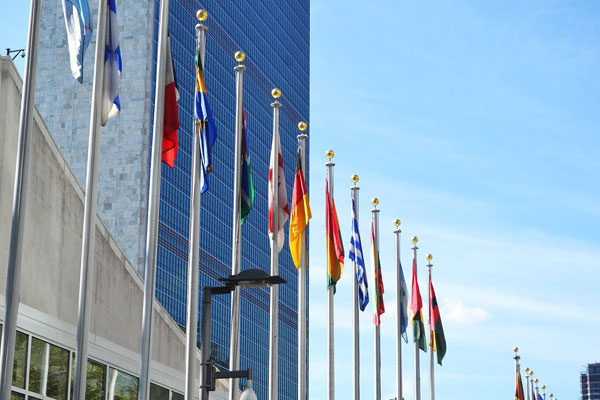UN brings back sanction on Iran following 10-year gap

[Flag Heaven City New York, Photo Credit to Pixabay]
On September 27, 2025(ET), the UNSC(UN Security Council) decided to reinstate sanctions on Iran.
This decision comes ten years after Iran signed the nuclear agreement (JCPOA·Joint Comprehensive Plan of Action) that limited its nuclear program and subjected it under international monitoring.
Seven years have passed since the U.S. President Donald Trump withdrew the United States from the JCPOA—declaring, “It is clear to me that we cannot prevent an Iranian nuclear bomb under the decaying and rotten structure of the current agreement”—and following recent moves by all three major European countries(E3· France, Germany, and the UK), so the JCPOA is effectively over.
This snapback procedure was led by the E3, who sought to automatically re-impose sanctions after citing that Iran’s stockpile of enriched uranium had severely exceeded the limit.
And this snapback procedure is not subject to a veto from Russia or China, both permanent members of the UNSC and allies of Iran.
This move reactivated a total of six sanctions, including prohibitions on nuclear program, and the arms trade, as well as travel bans on certain individuals and groups.
European countries had urged Iran to dispose of its enriched uranium reserves and allow inspections by the IAEA(International Atomic Energy Agency), but the Iran government refused their suggestion, and it led to European countries to impose sanctions.
Iran strongly opposed the decision.
On September 26, Iranian Ministry of Foreign Affairs Abbas Araghchi posted on his social media: “In the past days and weeks, Iran has put forward multiple proposals to keep the window for diplomacy open. The E3 has failed to reciprocate while the U.S. has doubled down on its dictates.”
Nonetheless, the Iranian government announced that it has no intention of withdrawing from the NPT(Non-Proliferation Treaty).
According to the AP, Iran currently possesses uranium enriched up to 60%, a level that allows it to quickly achieve the 90% purity required for weapons-grade material.
This indicates that Iran could potentially quickly produce several nuclear bombs if it were cornered.
Even prior to the imposition of sanctions discussed, Iran was already experiencing severe water shortages because of great heat and drought.
Furthermore, the value of Iran’s currency, the rial, is depreciating due to economic instability concerns stemming from the reimposed sanctions and the conflict with Israel.
According to Reuters, the rial reached an all time low, falling from 1,095,000 rials per U.S. dollar on the 26th to 1,123,000 rials per U.S. dollar on the 27th.
Given these circumstances, experts predict that importing water to solve the problems of drought and severe lack of water will become impossible for Iran.
U.S. Secretary of State Marco Rubio stated, “Sends a clear message: the world will not acquiesce to threats and half measures — and Tehran will be held to account.”
The Foreign Ministers of the E3 reaffirmed Iran’s responsibility, stating: “Since 2019, Iran has exceeded all limits on its nuclear programme that it had freely committed to under the JCPOA. According to the IAEA’s report of 4 September 2025, Iran holds a quantity of enriched uranium which is 48 times the JCPOA limit.”
Many countries are now closely monitoring the future of Iran, which faces a lot of problems of water scarcity, renewed economic sanctions, and conflicts with Israel.

- Yongjun Cho / G11
- The American School of Bangkok Green Valley

![THE HERALD STUDENT REPORTERS [US]](/assets/images/logo_student_us.png)
![THE HERALD STUDENT REPORTERS [Canada]](/assets/images/logo_student_ca.png)
